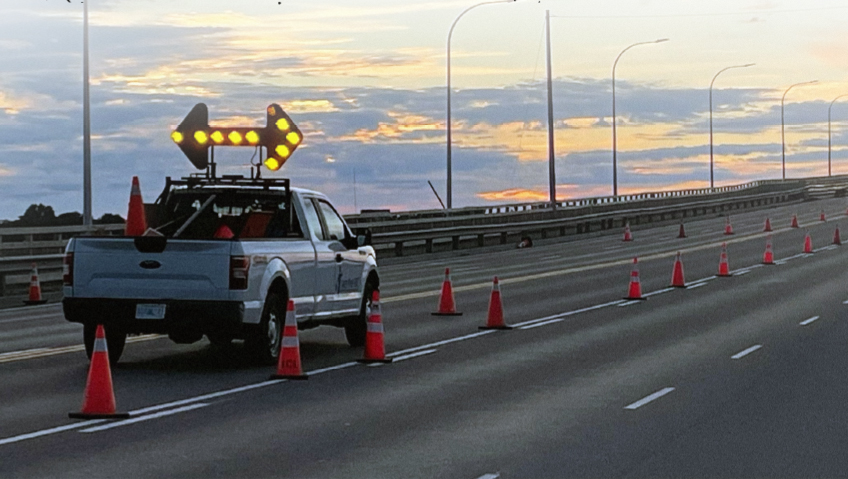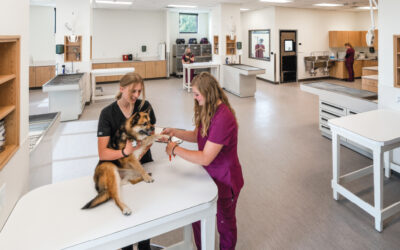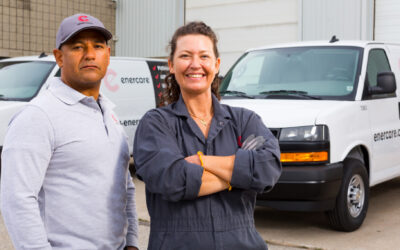Traffic control is challenging and often dangerous, but someone must do it. And Safety First-SFC does it best, after operating as the largest full-service traffic control company in the Atlantic provinces for almost 30 years.
With experienced personnel available 24 hours a day, 365 days a year, Safety First provides equipment for roads, sales and rentals, detailed traffic control plans, assistance during natural disasters, and also teaches 30 safety courses throughout the Atlantic Provinces and Ontario.
Whether it’s highway equipment for utilities, construction, film and special events, barriers, or arrow boards, Safety First offers a wide range of traffic control and safety-related products, many manufactured in Atlantic Canada, and the most experienced and knowledgeable instructors in the Atlantic provinces.
The initial owners, Ed Hennessey and James MacDonald, founded Safety First in Newfoundland in 1993. The business flourished and in 2018 was acquired by private equity firm The Riverside Company. Safety First will celebrate its 30th anniversary in 2023.
“We’re excited about it,” says General Manager Jason Hiltz. “It’s a huge testament to the quality of service that we provide out there. It’s also interesting that not only are we the largest traffic control company operating in Atlantic Canada, but also the longest-running, so it’s kind of cool.”
When it comes to the qualities that have contributed to the company’s success, Hiltz has an immediate answer. “I always say it’s all about the people you have working for you. It truly is all about the people. I’m very thankful for all of our employees and managers that have contributed along the way.”
As General Manager for the past 10 years, Hiltz has experienced a variety of challenges during his tenure and is visibly proud of Safety First’s people and what they’ve accomplished.
“We provide traffic control service, and it’s a 24/7 job,” he says. “We provide emergency services to many of our customers, whether it be power utility groups such as Nova Scotia Power or NB Power, or even the Bell and Rogers companies of the world.”
When internet service or the power grid goes down, the expectation is that Safety First operates with a high degree of urgency and gets crews out there quickly, he adds. “In the event of an emergency on a Saturday night or Christmas morning, Safety First is there to provide a service, and that comes with a ton of hard work and dedication by our people.”
While the people are what certainly have tied the company to 30 years of longevity, success is also about making bold moves, says Hiltz.
“Running a business isn’t easy and sometimes you’ve got to take some risks,” he says. “Thankfully, I think we’ve made and taken appropriate risks along the way and they’ve worked well for us.”
Bold moves enabled business diversification and a customer-first approach has contributed to success in the long term.
While Safety First is predominantly and primarily a traffic control service provider—what it does day in and day out and where 95 percent of its energies are focused—the company is also quite diversified, Hiltz says. “A lot of folks are surprised about everything we do.”
Safety First has two divisions with a natural fit to support its traffic control operations. The first is the traffic safety products division, which makes, manufactures, and sells traffic safety products used in the field while completing the task of providing traffic control service.
“We sell cones and traffic control signs and stands, pavement tape, anything you see in the roadways including speed radar signs, all the arrow boards and trailers and everything that gets used out in the field,” Hiltz says.
The second is the industrial safety course division, supporting its safety control operations, which Safety First brings to its long list of business-to-business contacts and customers. “Everybody on the road needs to be trained on various courses and certified; each province has an additional course tied to understanding the provincial traffic-control manual.”
Each of the company’s eight brick-and-mortar offices in the Atlantic provinces provides facilities for in-person classroom training for traffic control and first aid courses. Additional training includes fall protection, confined space, bucket evacuation, and other safety certification courses in an ongoing push to diversify the company.
“We have a parking enforcement division where we help municipalities with their winter parking bans. We put our workforce to good use and look for opportunities where Safety First can find a nice fit. Another example of this ‘can do’ attitude can be shown through our meter reading services division as well as our work at city landfills.”
Over the years, that fit has also included dealing with hurricane relief efforts such as during Hurricane Dorian, a rowdy visitor that blew in at the tail end of 2019, and the more recent Hurricane Fiona, the company’s largest hurricane-response effort to date.
“That was five weeks of full utilization of every crew we could put out in the field, seven days a week, 24/7, night shifts, and day shifts,” Hiltz says. “It was truly a multi-province effort. We sent crews from one province to another, from New Brunswick to PEI and to Nova Scotia to help them out. It was a record storm for Atlantic Canada.”
The last few years in particular have also seen labour costs rising 24 to 36 percent, and fuel costs exceptionally high, two significant variable strikes against the profitability of the business.
But despite the ongoing challenges, Safety First continues to embrace the promise of its name, ensuring safety in the workplace is always a priority.
“These days, health and safety workplace procedures are important for the well-being of both employees and employers,” Hiltz says. “Human loss is immeasurable and we can’t tolerate it. Every person who leaves their home for work in the morning should come back to their home in the evening in good health.”
The trouble with traffic control is it’s truly a high-risk environment, he says. “When you think of what it is we do out there, unfortunately when it comes to vehicles travelling at sometimes very high and excessive speeds, should a collision occur, you don’t get a second chance.”
With distracted driving seemingly at an all-time high, the risks imposed on workers also continue to rise.
“Our employees must have their head on a swivel to avoid a potentially catastrophic incident,” says Hiltz. “Workplace safety is important for every employee because all workers want to work in safe and productive conditions. It’s the company’s duty and moral responsibility to look after employees’ protection.”
Safety First does things differently, starting with referring to its flaggers as “protectors.” “The reason is that the primary objective of our business is to provide temporary work zone protection for our customers while they work on the streets and highways,” Hiltz explains.
“One of our company mantras is, ‘protecting your people, your time and your business.’ Taking a step back and considering what that means correlates well with safety and why it’s so important in the workplace. It speaks to the reduction of accidents and incidents as well as running a profitable, efficient business. That’s why selecting reputable traffic control service providers to complete your work is so important.”
The 24/7 nature of the environment means managing a variable workload, he adds. Safety First is entirely business-to-business as related to traffic control; if the company doesn’t need traffic control one day, it might not have work for everybody versus another day when the phone could be ringing off the hook. There are not enough people to supply the demand.
“It’s that variation of one day to the next and trying to find the correct ratio of the staff. That’s always a moving target and it’s hard to hit, especially in today’s labour market where finding quality employees is so hard.”
The job is not only hard, it’s risky, and the competency of protectors in complex situations is obviously essential. “It’s more than just flipping paddles out there,” Hiltz says. “It’s a skill set and takes a certain type of person, one, to enjoy the job and, two, do a good job of it.”
Along with diversification and qualified employees putting Safety First on the road to success, it also has reliable partners, such as JP’s Garage, says Hiltz.
“We can explore efficiencies, as we have a fleet of approximately 175 ‘company assets.’ We’ve converted some to a dual fuel system so they run on propane and gasoline to combat the rising fuel cost,” Hiltz says. “It’s that attitude that keeps you in business for 30 years, the bold moves that allow you to try different things that hopefully work out.”
While Hiltz has a host of milestones in mind for the company, a notable one is expanding business outside of Atlantic Canada. Currently operating across Nova Scotia, Newfoundland, New Brunswick and PEI, together with parent company Area Wide Protective, Safety First is the largest traffic-control-service provider in North America and maybe the world, Hiltz says. Operations stretch to California and Hawaii, and throughout Atlantic Canada.
Being the largest brings with it the largest workforce, the greatest ability to manage changing workloads, and allows the company to diversify into other industries, says Hiltz, as well as giving access to capital, the latest technologies, and the best practices in the industry.
“Being the largest and the longest-running company is again proof of the state of the practices we provide in putting safety first and putting the customer first. When a storm such as Fiona hits, you can count on Safety First to have the largest workforce to satisfy the recovery effort, whether we’re moving crews from Newfoundland to New Brunswick or New Brunswick to Nova Scotia. That workforce is impactful.”
It certainly is: another milestone has 700 protectors out conducting traffic control activities in one day, he says, beating the previous record of 600 earlier in 2022.
Of course, protecting those protectors is the top priority for the company every year.
“Going a full year accident and injury-free is the goal and that would be just an extraordinary milestone to achieve,” Hiltz says. “Everyone coming home safe the same way they started out. Safety is always at the forefront of what we do. It has to be, it’s our name. That’s our shooting-for-the-star milestone.”













